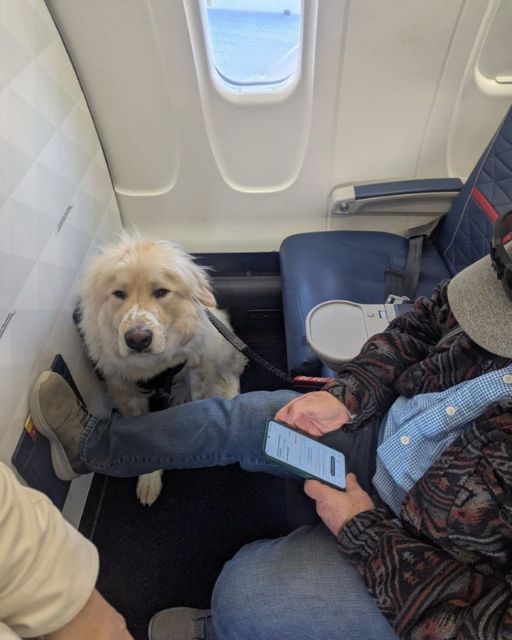It was meant to be just another flight.
I was heading back to Seattle after a tough weekend in Phoenix—too hot, too dry, and full of reminders about the conference I still wasn’t ready for. But I had Max, my golden mix and service dog trained to help with anxiety and panic attacks. He wasn’t just my support; he seemed to sense feelings better than anyone else. Having him with me was the reason I even got on the plane.
We took our usual seats in the bulkhead row, window side. Max quickly curled up by my boots, calmly watching everything with his focused gaze. I put on my headphones and tried to forget the awkward interaction with my boss earlier, who said, “Good job,” but his eyes told me otherwise.
The man who took the aisle seat next to us didn’t notice me at all.
He looked about mid-sixties—tall and lean, wearing khakis and a simple navy jacket, the kind people wear when they don’t want to fuss with coats. He didn’t make eye contact, just nodded slightly as he sat, then focused on his phone, scrolling with distracted eyes.
I didn’t think much of it. I know flights well—some people are talkative, some are distant. He was definitely the quiet type.
Then Max got up.
That was unusual—Max never moves like that during boarding unless something’s off. This time, he stood carefully and looked straight at the man’s face. Without a sound, Max nudged his head against the man’s knee and sat beside him, calm and steady.
The man froze. I started to call Max back, but then I saw his hand trembling as it reached down to stroke Max’s fur. He sighed softly, like he’d been holding his breath for a long time.
“Golden Retriever?” he asked quietly.
“Mostly,” I replied, “with a bit of Pyrenees.”
He kept petting Max gently, like touching a memory.
After a few minutes of silence, he said, “I had one just like him. Lost her last winter.”
Max leaned in closer, pressing against the man’s leg as if to steady him. The man didn’t cry, but his tense expression softened.
As the plane started taxiing, he kept his hand on Max’s head and whispered a name: “Rosie.”
I looked away, not because I was uncomfortable but because Max seemed to bring out something deep in people—layers they didn’t even know they had.
We were airborne before he spoke again.
“This is my first flight since she passed,” he said quietly. “I used to take her everywhere—even drove from Maine to New Mexico, sleeping in the back of the car.”
I smiled softly. “Max and I did a road trip last year, from Oregon to Denver. He wouldn’t let me sleep unless one paw was on my chest.”
He chuckled, faint but real.
“I’m Walter,” he said, offering his hand.
“Callie,” I replied, shaking it. “And this is Max.”
“I figured,” he smiled, glancing down at Max.
We didn’t say much after that. It was a quiet connection, the kind that doesn’t need words. Walter stroked Max’s head occasionally, murmuring to himself. I leaned back, letting the drone of the engines and Max’s steady breathing settle us.
Somewhere over Colorado, Walter asked, “Do you believe in signs?”
I thought for a moment. “You mean like fate?”
He shrugged. “Maybe just little nudges when you’re stuck in your own head.”
I nodded. “I think we notice what we need to. Max always picks up on things before I do.”
Walter looked down. “I almost canceled this trip. I’m visiting my daughter. We haven’t really talked since Rosie died. I felt like a ghost for a while.”
I stayed silent. That kind of honesty needs space.
“Maybe Max was your sign,” I said. “Or maybe Rosie sent one through him.”
He looked at me, truly looked, and asked, “You think dogs do that?”
I smiled. “If anyone could, it would be them.”
As we began our descent, Walter asked if I’d take a photo of Max with him.
“Of course,” I said.
I snapped a picture on his phone—Max sitting between us, Walter’s hand resting on his back, like they’d known each other forever.
Then, just as we were about to land, Walter pulled out a folded letter.
“I was going to leave this in my hotel room,” he said, “just in case.”
My stomach tightened as I read the first line. It was a goodbye letter to his daughter, filled with grief and guilt over losing Rosie, the dog who had been his anchor through the hardest years.
“I didn’t realize how bad things were until your dog looked at me like I mattered,” he said softly.
I handed the letter back, unsure what to say.
“Thank you,” he said. “You and Max might’ve changed the ending of a very different story.”
We landed shortly after. At the gate, Walter gave Max one last scratch and said, “Can I send you that photo? I want my daughter to see the moment everything changed.”
“Please do,” I said.
He texted it immediately, with the caption:
“This is Max. He saved my life before we even left the runway.”
As Walter walked away, I saw his shoulders straighten just a bit, like hope had found him again.
Max nudged my leg and looked up.
I smiled. “Good job, buddy.”
If you’ve ever had an animal change everything for you—even strangers’ animals—you know exactly what I mean. Share this if you believe in those quiet moments that save us, one breath at a time.
